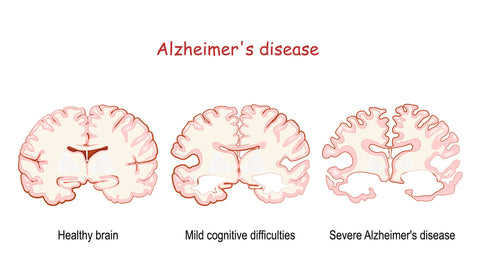Your cart is empty
Free shipping on all US orders


Free shipping on all orders

Caffeine is described as a mixed bag. Many love it, but almost just as many are scared of it.
Turns out, however, that caffeine is really good for you (and not nearly as bad). In this blog post, we take a look at the merits of caffeine and why you should be taking it (if you can).
Have you ever stopped to think about the journey your morning cup of coffee or tea has taken through history to land in your hands? The story of caffeine is a fascinating one that goes through different cultures and continents.
Let's start in the highlands of Ethiopia, where coffee's journey begins. Legend has it that a goat herder named Kaldi noticed his goats frolicking with unusual vigor after nibbling on bright red berries from a certain tree. Curious, he naturally tried these berries and felt that same surge of energy. Word spread, and soon the local monks began using coffee to stay alert during long hours of prayer. From these humble beginnings, coffee started its voyage across the globe.
Next, the story goes to ancient China around 2737 BCE, during the reign of Emperor Shen Nong. As the story goes, some tea leaves accidentally blew into the emperor's pot of boiling water. Intrigued by the aromatic infusion, he took a sip and found it refreshing. If you were there, you'd witness the birth of a tradition that values tea not just as a beverage but as a vital part of culture and medicine. Tea ceremonies became a way to promote harmony and mindfulness, traditions that continue to this day.
Now, let's journey to South America, where the indigenous Guaraní people have been cultivating yerba mate for centuries. The leaves of the Ilex paraguariensis plant are rich in caffeine and other nutrients, offering you both energy and health benefits. Yerba mate isn't just a drink; it's a social ritual that fosters connection and well-being.
Coffee moved from Ethiopia to the Arabian Peninsula, where it became a staple in coffee houses—places that were the epicenters of intellectual discussions. You might find it fascinating that European explorers and traders couldn't resist bringing coffee back home, leading to its widespread popularity.
Tea followed a similar path. After flourishing in China and Japan, it captured the attention of European traders. The British, in particular, developed a taste for tea, making it a cornerstone of their daily life. This led to significant historical events, like the Boston Tea Party, which you might recall as a pivotal moment in American history.
Yerba mate, while less known globally, has made its way beyond South America, and you can now find it in health food stores and cafes around the world. Its journey illustrates how globalization allows you to experience and enjoy cultural practices from distant lands.
With that in mind, it’s time we move on to the man of the hour; the caffeine contained within that is majorly responsible for much of their acceptance and spread across the world.
Some people compare chemistry to magic- which in certain ways is true. How else could you explain the near-miraculous way caffeinated beverages work once ingested?
But no, we’re going to put those benefits into context, thanks to having a little look at the chemistry and mechanism. We promise it won't be as difficult as rocket science.

Caffeine is a complex molecule that belongs to the methylxanthine class of compounds. If you could zoom in to see caffeine at the molecular level, you'd find a structure composed of carbon, hydrogen, nitrogen, and oxygen atoms arranged in a specific configuration. Its chemical formula is C₈H₁₀N₄O₂.
Being part of the methylxanthine family means caffeine shares similarities with other compounds like theophylline and theobromine, found in tea and chocolate, respectively. These compounds have a core structure known as xanthine, which is modified by the addition of methyl groups (hence "methyl" xanthine). This structure is crucial because it allows caffeine to interact with various receptors in your body, leading to its stimulating effects.
So, how does caffeine go from being a molecule in your cup to a stimulant in your system? It all starts when you consume a caffeinated beverage. Caffeine is rapidly absorbed into your bloodstream through your stomach and small intestine, usually reaching peak levels within 30 to 60 minutes. From there, it crosses the blood-brain barrier, directly affecting your central nervous system.
One of the primary ways caffeine works is by blocking adenosine receptors in your brain. Adenosine is a neurotransmitter that promotes relaxation and drowsiness by slowing down nerve activity. Under normal circumstances, adenosine binds to its receptors, signaling your body to wind down, especially as the day progresses.
Think of adenosine receptors as parking spots and adenosine molecules as cars looking to park. When you consume caffeine, it competes with adenosine for those parking spots because it has a similar structure. Caffeine effectively "parks" in the adenosine receptors without activating them, blocking adenosine from binding and sending its sleep-inducing signals. This is known as competitive inhibition.
But the story doesn't end there. With adenosine blocked, your brain's neurons start firing more actively. Your pituitary gland notices this increased activity and thinks some sort of emergency is happening, prompting it to release hormones that signal your adrenal glands to produce adrenaline (epinephrine). Adrenaline is the "fight or flight" hormone that prepares your body for physical exertion, increasing your heart rate and blood pressure.
In addition, caffeine increases the levels of other neurotransmitters like dopamine and norepinephrine. Dopamine is associated with the brain's reward and pleasure centers, enhancing your mood and motivation. Norepinephrine helps increase alertness and focus. The combined effect of these neurotransmitters elevates your overall mental state, making you feel more awake and attentive.
Caffeine offers several short-term health benefits that can enhance your daily life. These include:
One of the most noticeable effects of caffeine is its ability to enhance your alertness and concentration in a pinch. When you consume caffeine, it quickly enters your bloodstream and makes its way to your brain. There, it blocks the neurotransmitter adenosine, which is responsible for making you feel tired. By inhibiting adenosine, caffeine prevents drowsiness, allowing you to stay awake and focused.

This blockage leads to increased neuronal firing in your brain, stimulating the release of other neurotransmitters like dopamine and norepinephrine. These chemicals improve your focus and cognitive performance, making it easier for you to concentrate on tasks, process information more efficiently, and react more quickly. Whether you're studying for an exam, working on a complex project, or need to stay alert during a long drive, caffeine can help sharpen your mental faculties.
If you're looking to enhance your physical performance, caffeine might be your secret weapon. Consuming caffeine increases adrenaline levels in your body. Adrenaline helps prepare your body for physical exertion. It raises your heart rate, opens up your airways, and directs blood flow to your muscles.
This surge of adrenaline can enhance your endurance and strength. By stimulating your nervous system, caffeine signals your fat cells to break down body fat, making free fatty acids available as fuel. This can improve your physical performance during activities like running, cycling, or lifting weights. So, if you consume caffeine before a workout, you may find that you can exercise longer and with more intensity.
This is why many pre-workout supplements heavily rely on caffeine as a primary ingredient in order to boost performance. Dawn To Dusk is a no-crash energy support supplement that can help you get the most out of your workout, or during the day when you need that boost.
Ever notice how a cup of coffee lifts your spirits? Caffeine doesn't just energize your body; it can also elevate your mood. By increasing the levels of neurotransmitters like dopamine and serotonin, caffeine promotes feelings of well-being and happiness. Dopamine is associated with the pleasure centers of your brain, enhancing motivation and reward, while serotonin helps regulate mood and social behavior.
This mood-enhancing effect can make you feel more positive and less prone to stress. It's one of the reasons why social gatherings often revolve around coffee or tea—you not only enjoy the taste but also the subtle uplift in your mood. So, when you're feeling a bit down or sluggish, a caffeinated beverage might just give you that emotional boost you need.
Caffeine doesn't just help you feel more awake; it can also enhance your cognitive function. By improving neural activity in your brain, caffeine aids in learning and memory tasks. It increases the concentration of neurotransmitters that are involved in memory and learning processes, such as acetylcholine.
This means you might find it easier to absorb new information or recall details when you need them. Whether you're trying to memorize a speech, learn a new skill, or solve complex problems, caffeine can help your brain function more effectively. It can improve reaction times, logical reasoning, and even creative thinking.
Did you know that your regular cup of coffee or tea might also offer significant long-term health benefits? Seems like there isn’t much a nice cuppa can’t take care of, eh?
One of the most remarkable long-term benefits of caffeine is its potential to lower your risk of developing neurodegenerative diseases like Parkinson's and Alzheimer's.

Caffeine isn't just a stimulating compound; it's also rich in antioxidants. These are compounds that help protect your cells from oxidative stress caused by free radicals—unstable molecules that can damage cells, proteins, and DNA.
Heart disease remains one of the leading causes of death worldwide. Interestingly, moderate caffeine consumption may have a protective effect on your (healthy) heart, and not a deleterious one as previously thought
Type 2 diabetes is a growing health concern globally, but caffeine might offer some protective benefits in this area as well.
While caffeine offers many benefits, it's important for you to be aware of potential concerns and side effects to make informed choices about your consumption.
If you're sensitive to caffeine, even small amounts can lead to unpleasant side effects. You might experience feelings of anxiety or jitteriness, as caffeine stimulates your nervous system.
This overactivation can make you feel restless or nervous. Additionally, consuming caffeine, especially later in the day, can interfere with your sleep patterns, leading to insomnia. To avoid these issues, you may consider moderating your intake or opting for decaffeinated alternatives.
Regular consumption of caffeine can lead to physical dependency. If you've ever skipped your morning coffee and ended up with a pounding headache, you've experienced a common withdrawal symptom. Irritability and fatigue are also signs that your body has become accustomed to caffeine's effects. When you decide to cut back, it's helpful to do so gradually to minimize these withdrawal symptoms and give your body time to adjust.

If you're pregnant or planning to become pregnant, it's important to monitor your caffeine intake. High levels of caffeine can cross the placenta and affect your developing baby, potentially leading to low birth weight or other complications. Health experts often advise limiting your caffeine consumption to less than 200 milligrams per day during pregnancy—that's about one 12-ounce cup of coffee. Consulting with your healthcare provider can give you personalized guidance for your circumstances.
Caffeine can interact with certain medications, potentially altering their effectiveness or increasing side effects. For example, if you're taking specific antibiotics or antidepressants, caffeine might intensify feelings of jitteriness or rapid heartbeat. Additionally, caffeine can interfere with the absorption of certain medications, reducing their efficacy. It's a good idea to review your medications with your doctor or pharmacist to understand any possible interactions with caffeine.
Caffeine's discovery and use has altered human history for the better. There are few ergogenics that can match its potential and safety, when used judiciously. As long as you can safely tolerate it, go for gold.